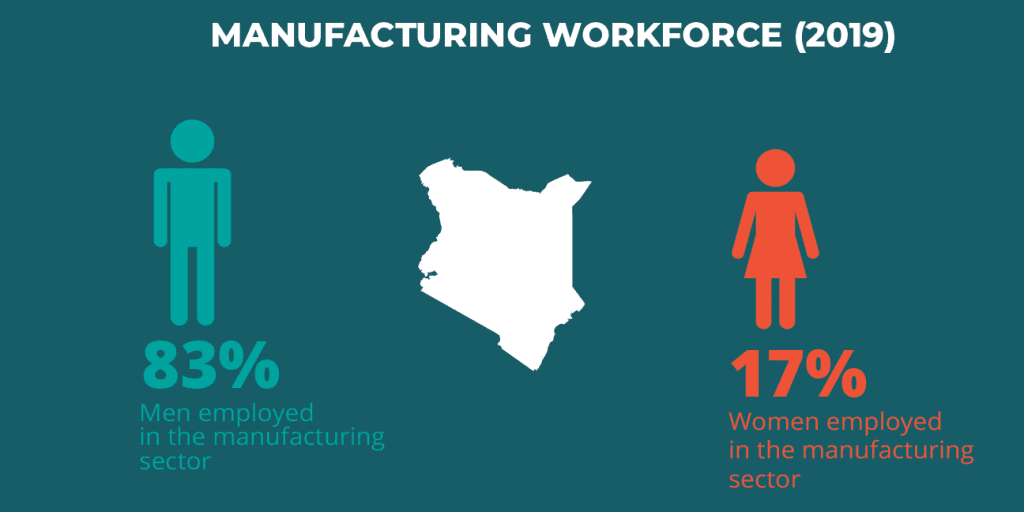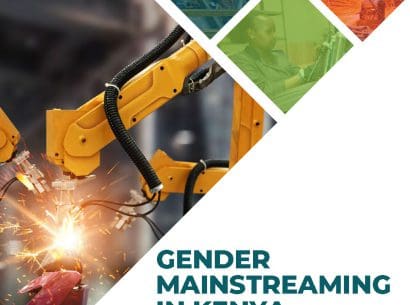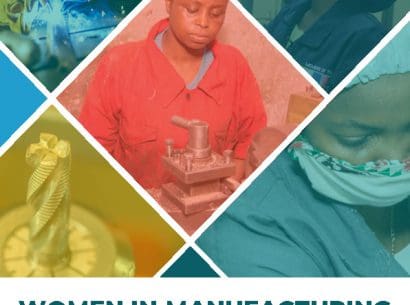
Women in Manufacturing: Mainstreaming Gender and Inclusion in Kenya
Manufacturing is a key pillar of Kenya’s economic growth, and has a direct and indirect impact on the development of other sectors of the economy. While women are not explicitly excluded from the manufacturing sector, they remain both under-represented and under-valued.
ICRW and The Kenya Association of Manufacturer’s Women in Manufacturing (WIM) programme undertook a formative study to explore the context in which women participate in Kenya’s manufacturing sector, and highlight opportunities to foster greater participation and inclusion of women.
![]()
Key Findings
Findings from Review of Legislative, Policy, and Institutional Frameworks
- Although Kenya has a robust legal and policy framework that lays a foundation for manufacturing, the majority of these policies are either gender-neutral or not implemented and have therefore not translated into equitable participation of women in manufacturing.
- Critical reflection on the social and cultural contexts that influence policy formulation and implementation is necessary.
Findings on the Status of Women in Manufacturing
- Kenya’s manufacturing companies are predominately male-owned and staffed across all sub-sectors.
- Most female-owned or led companies had been in operation for 10 years or less, which could be indicative of women’s recent entry into the manufacturing sector.
- Women-owned and -led companies were more likely to have a higher proportion of women in senior management as well as in the rest of the workforce. These companies were also more likely to implement gender-responsive human resource policies and practices.
- Women comprised 16 percent of people involved in the formal manufacturing sector in 2018 and 17 percent in 2019 — an increase in employment opportunities of just 1 percent.
- Most women-owned manufacturing businesses are micro, small and medium enterprises (MSME) and operate in the informal sector. Despite the fact that women-owned MSME comprise 20 percent of Kenya’s GDP, many of these businesses remain unable to grow into medium-sized enterprises and experience a high cost of production, high cost of transport, and high cost of capital outlay.
Key Recommendations
Legal Recommendations
- A deliberate effort to review specific laws that affect the manufacturing sector through a gender lens and create guidelines for gender-responsive implementation is required.
- Strengthen implementation of existing gender-aware or gender-sensitive laws through guidelines that recognize and address the differential gender needs of entrepreneurs.
- Create effective collaborative engagements between public sector oversight agencies such to ensure compliance in the implementation of the laws that affect women in manufacturing.
Policy Recommendations
- Consolidate legal, regulatory, and compliance requirements in a single place to enhance efficiency and reduce the cost of doing business.
- Implement STEM awareness campaigns aimed at girls and young women that encourage them to take up STEM subjects and join TVET or other skills-based courses.
- Provide affirmative action spaces to women in STEM courses.
- Lobby for targeted financial and tax education and exemptions for women-led and women-owned manufacturing companies.
Recommendations for Kenya Association of Manufacturers
- Develop transformative models and standards that address workplace gender gaps.
- Strengthen the WIM Programme to amplify the voices of women in manufacturing for policy advocacy and change.
- Lead private sector public policy dialogue that is integrative, inclusive, and responsive to the needs of women in manufacturing
- Support formalisation of informal women-owned SMEs in manufacturing.
- Build strategic partnerships with academic and TVET institutions to improve the curricula and training courses.
- Facilitate individual companies with toolkits that provide clear guidance and indicators to gender mainstreaming and diversity in manufacturing processes and management.
- Develop an incubation platform for women-owned manufacturing businesses to scale up and realize their potential
- Carry out periodic assessments of the challenges faced by informal and micro-small enterprises in the
manufacturing sector to data for decision-making.
Report Launch Event
On September 29th, 2020, ICRW Africa and KAM hosted a livestreamed event to share the findings and recommendations from the report, as well as discuss the current state of the industry and a path forward with key development partners and women working in the sector. Watch the event recording by clicking below.
Mugyenyi C., Nduta N., Ajema C., Afifu C., Yegon E. 2020. Women In Manufacturing In Kenya: Mainstreaming Gender And Inclusion. Nairobi Kenya: International Center for Research on Women



